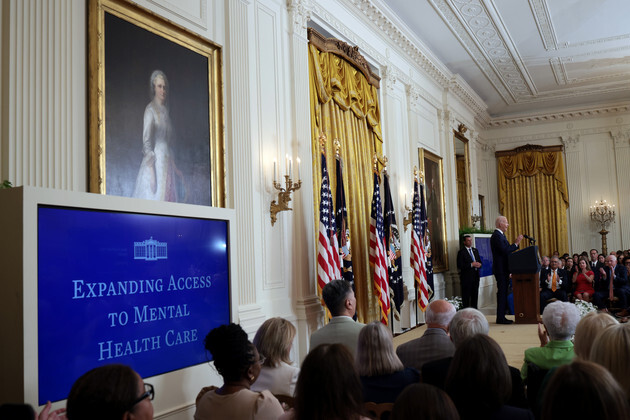Balancing Act: Biden’s Crackdown on Health Insurers and the Debate Over Equitable Access to Mental Healthcare

The Biden administration is taking action against health insurers for violating a federal law mandating equal access to mental health care, proposing new regulations with potential fines, while insurers, supported by major corporations, argue that workforce shortages are the main barrier to care as the battle unfolds amid a surge in mental health needs among Americans during the ongoing pandemic.Photo(gettyimages)
READ ALSO: At Robert F. Kennedy Jr. LA Event An Armed Man Pretending To Be A U.S. Marshal Has Been Arrested
The Battle for Mental Health Parity: Biden’s Regulatory Standoff with Insurers
The Biden administration is cracking down on health insurers accused of not treating access to mental health care equally with other healthcare services. They’ve proposed new rules and the threat of hefty fines for non-compliance. However, major insurance companies, with support from big corporations, argue this approach could worsen existing challenges in access to mental health care, especially during the ongoing pandemic when the demand for mental health services is high.
While the administration hopes for cooperation, it has also implemented punitive measures, including daily fines of $100 per policyholder, to compel insurers to close loopholes that restrict access to mental health care. These loopholes include requiring doctors to seek insurer approval before delivering care, reducing reimbursement rates for mental health providers, and limiting the number of in-network physicians available to patients.
Insurance companies counter that the root issue lies in the shortage of qualified mental health care providers, affecting nearly half of the U.S. population residing in areas with an access to mental health care worker shortage.
Addressing the Mental Health Crisis: Biden’s Efforts to Improve Access to Mental Health Care in the Face of Pandemic Challenges and Industry Resistance
The COVID-19 pandemic has exacerbated mental health conditions and substance use disorders, with more than a third of adults experiencing anxiety or depression symptoms. However, despite the increasing demand for mental health care, access to such care has lagged, with estimates indicating that over half of adults with mental illness do not receive treatment. The battle over access to mental health care extends back decades, with various administrations working to bridge the gap. President Biden’s proposed regulations aim to analyze insurers’ coverage to ensure equivalent access to mental health care based on outcomes, targeting issues such as “ghost networks” that lack sufficient mental health providers. The regulations also address prior authorization requirements and potential roadblocks to access to mental health care.
While the administration seeks to enforce these regulations, insurers and their allies contend that the complexities of access to mental health care go beyond the current proposal and are rooted in workforce shortages. They argue that insurers have already implemented strategies like telehealth coverage and integrated care to enhance access. The debate over the rules and their potential impact on access to mental health care continues, with public comments open until October 2. The insurance companies’ perspective is further bolstered by large corporations represented by the ERISA Industry Committee, which has called for an extension of the comment period, expressing concerns about unintended consequences and access to care.
READ ALSO: Nebraska Football Player Arik Gilbert Gets Arrested Second Time Around

















































